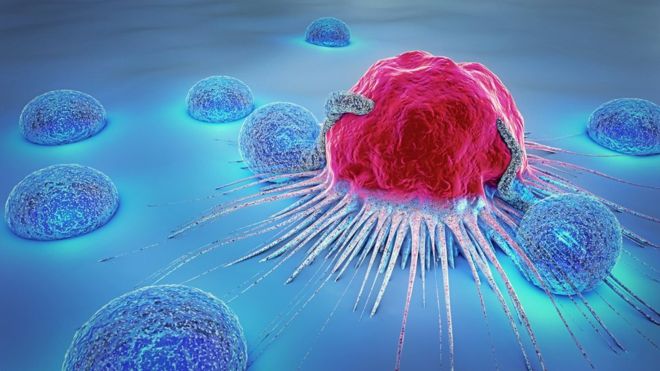
Sting Newz Service: Cancer gives most people no symptoms or signs that exclusively indicate the disease. Unfortunately, every complaint or symptom of cancer can be explained by a harmless condition as well. If certain symptoms occur or persist, however, a doctor should be seen for further evaluation. Some common symptoms that may occur with cancer are as follows:
Persistent cough or blood-tinged saliva
These symptoms usually represent simple infections such as bronchitis or sinusitis.
They could be symptoms of cancer of the lung, head, and neck. Anyone with a nagging cough that lasts more than a month or with blood in the mucus that is coughed up should see a doctor.
A change in bowel habits
Most changes in bowel habits are related to your diet and fluid intake.
Doctors sometimes see pencil-thin stools with colon cancer.
Occasionally, cancer exhibits continuous diarrhea.
Some people with cancer feel as if they need to have a bowel movement and still feel that way after they have had a bowel movement. If any of these abnormal bowel complaints last more than a few days, they require evaluation.
A significant change in bowel habits that cannot be easily explained by dietary changes needs to be evaluated.
Blood in the stool
A doctor always should investigate blood in your stool.
Hemorrhoids frequently cause rectal bleeding, but because hemorrhoids are so common, they may exist with cancer. Therefore, even when you have hemorrhoids, you should have a doctor examine your entire intestinal tract when you have blood in your bowel movements.
With some individuals, X-ray studies may be enough to clarify a diagnosis.
Colonoscopy is usually recommended. Routine colonoscopy, even without symptoms, is recommended once you are 50 years old.
Sometimes when the source of bleeding is entirely clear (for example, recurrent ulcers), these studies may not be needed.
Unexplained anemia (low blood count)
Anemia is a condition in which people have fewer than the expected number of red blood cells in their blood. Anemia should always be investigated.
There are many kinds of anemia, but blood loss almost always causes iron deficiency anemia. Unless there is an obvious source of ongoing blood loss, this anemia needs to be explained.
Many cancers can cause anemia, but bowel cancers most commonly cause iron deficiency anemia. Evaluation should include endoscopy or X-ray studies of your upper and lower intestinal tracts.
Breast lump or breast discharge
Most breast lumps are noncancerous tumors such as fibroadenomas or cysts. But all breast lumps need to be thoroughly investigated.
A negative mammogram result is not usually sufficient to evaluate a breast lump. Your doctor needs to determine the appropriate X-ray study which might include an MRI or an ultrasound of the breast.
Generally, diagnosis requires a needle aspiration or biopsy (a small tissue sample).
Discharge from a breast is common, but some forms of discharge may be signs of cancer. If discharge is bloody or from only one nipple, further evaluation is recommended.
Women are advised to conduct monthly breast self-examinations.
Lumps in the testicles
Most men (90%) with cancer of the testicle have a painless or uncomfortable lump on a testicle.
Some men have an enlarged testicle.
Other conditions, such as infections and swollen veins, can also cause changes in your testicles, but any lump should be evaluated.
Men are advised to conduct monthly testicular self-examinations.
A change in urination
Urinary symptoms can include frequent urination, small amounts of urine, and slow urine flow or a general change in bladder function.
These symptoms can be caused by urinary infections (usually in women) or, in men, by an enlarged prostate gland.
Most men will suffer from harmless prostate enlargement as they age and will often have these urinary symptoms.
These symptoms may also signal prostate cancer.
Men experiencing urinary symptoms need further investigation, possibly including blood tests and a digital rectal exam. The PSA blood test, its indications, and interpretation of results should be discussed with your health care provider.
If cancer is suspected, a biopsy of the prostate may be needed.
Cancer of the bladder and pelvic tumors can also cause irritation of the bladder and urinary frequency. (Courtesy: www.emedicinehealth.com)





